Does Self-Stimulation Affect Male Fertility? Separating Health Myths from Facts
Side effects of Masterburate for male are a topic many men think about but don’t always discuss openly. You might wonder if this common habit could lead to problems like tiredness or issues with having kids. At EIRMED, our site focused on fertility and infertility, we provide info and products to help with male and female health needs. This guide looks closely at side effects of masturbation for male, using facts from experts to clear up confusion. We’ll cover body changes, mind effects, and links to fertility. By reading, you’ll know more about what’s true and how to stay well.
Masturbation is when you touch yourself for sexual pleasure. It’s normal for most guys and can be part of a healthy life. But some worry about side effects of masturbation for male, like if it drains energy or affects sperm. We’ll use info from health sites and studies to explain.
Introduction: Addressing a Common Reproductive Health Concern
For men who are planning to conceive or are concerned about their reproductive well-being, questions surrounding self-stimulation (masturbation) and its impact on fertility are highly prevalent. Generations of myths and misinformation have often fueled anxiety about this natural human activity.
This article provides an evidence-based, clinical perspective on how the frequency of ejaculation through self-stimulation may influence key markers of male fertility, including sperm count, sperm quality, and hormonal balance. The overwhelming scientific consensus is clear: moderate self-stimulation is a normal and healthy component of sexual well-being and does not cause long-term infertility.
Self-Stimulation and Sperm Health | Myths vs. Facts
The primary concern for men about masturbation is its effect on the quantity and viability of sperm. The body continuously produces sperm, but the frequency of ejaculation can cause temporary changes.
 Myth 1: Frequent Self-Stimulation Causes Low Sperm Count or Infertility (Azoospermia)
Myth 1: Frequent Self-Stimulation Causes Low Sperm Count or Infertility (Azoospermia)
FACT: Frequent ejaculation may cause a temporary reduction in sperm count and semen volume, but it does not lead to long-term infertility or a permanent deficit in sperm production.
- Sperm Production is Continuous: Spermatogenesis, the process of sperm production, is ongoing. The body rapidly replenishes the supply of sperm in the seminal vesicles after ejaculation, typically within 24 to 48 hours.
- Temporary Fluctuation: Research suggests that men who ejaculate multiple times within a very short period (e.g., several times per day) will have lower sperm concentration in the subsequent samples. This is a short-term effect and does not indicate a reproductive health problem.
Myth 2: Abstinence (Semen Retention) Maximizes Sperm Quality
FACT: Long periods of abstinence can actually be detrimental to sperm quality.
- The Problem of Storage: Sperm cells are vulnerable to damage (oxidative stress) while they sit in storage. Studies have shown that prolonged abstinence (more than 5 to 7 days) can increase the percentage of non-motile (non-swimming) or fragmented DNA in the sperm sample, reducing its overall quality and viability.
- The Optimal Window: For couples trying to conceive, or before a diagnostic test like a semen analysis, medical professionals generally recommend a period of abstinence lasting 2 to 5 days to ensure the best balance between high sperm count and optimal quality (Mayo Clinic).
Side Effects of Masterburate For Male Some in Short
Masturbation is a normal and healthy sexual activity for men when done in moderation. However, excessive or compulsive masturbation can lead to certain physical and psychological side effects. Physically, over-masturbation may cause fatigue, weakness, and reduced sensitivity due to continuous stimulation. Some men may experience temporary erectile issues or delayed ejaculation, especially when combined with frequent use of pornography.
Mentally, it can trigger feelings of guilt, anxiety, or low motivation if practiced excessively. In rare cases, it might slightly affect sperm quality or testosterone levels for a short time, though this is not permanent. Skin irritation or soreness may also occur due to friction or lack of lubrication. Maintaining a balanced approach helps avoid these side effects and ensures masturbation remains a healthy part of male sexual well-being.
Impact on Specific Sperm Parameters
Potential Side Effects of Excessive Self-Stimulation
While moderate self-stimulation is physiologically safe, excessive or aggressive habits can lead to specific, non-fertility-related issues. The key differentiation is whether the activity begins to interfere with one’s daily life or causes physical discomfort.
1. Physical and Sexual Health Effects
- Decreased Sexual Sensitivity (Desensitization): Overly vigorous or aggressive techniques can temporarily desensitize the genital area. This is not permanent, but it may require a change in technique or a period of reduction to restore baseline sensation, potentially making partnered sexual activity less satisfying.
- Fatigue and Lethargy: Excessive frequency, particularly if it disrupts sleep patterns or replaces exercise, can lead to chronic fatigue and a temporary dip in energy levels due to hormonal changes (release of prolactin post-orgasm).
- Genital Trauma: While rare, aggressive manipulation can cause superficial skin irritation, swelling (edema), or in severe cases, more significant injury. Lubrication is recommended to mitigate friction-related injury.
Physical side effects of masturbation for male can occur if overdone. Skin chafing is common from rough handling without lube – like a sore from friction. It heals with rest.
Edema, or swelling, might happen from repeated sessions. It’s temporary and goes away soon. Fatigue after is due to hormone release making you relaxed and sleepy. Not harmful, but daily might lower overall pep. shreeivfclinic
Some report back aches from muscle tension. Ease up to avoid. Acne or hair loss? Not linked – those are hormone myths. Most physical side effects of masturbation for male are minor; pay attention to your body.
2. Hormonal Balance (Testosterone)
A common myth suggests that ejaculation depletes testosterone.
- The Scientific View: Studies show that while testosterone levels may spike briefly before ejaculation and then experience a rapid drop immediately afterward, this change is minor and temporary. Self-stimulation does not cause long-term low testosterone (hypogonadism). Other factors, such as age, sleep, diet, and exercise, are far more significant determinants of a man’s overall testosterone level.
3. Psychological and Behavioral Impact
The most significant health concern related to excessive self-stimulation is not physical, but psychological, when the habit becomes compulsive or addictive.
- Interference with Daily Life: The activity becomes problematic when it interferes with work, studies, social commitments, or relationships. Using self-stimulation as the primary or sole coping mechanism for stress, anxiety, or depression may indicate a need for counseling or professional support.
- Guilt and Shame: For many men, cultural or religious taboos surrounding the activity can cause significant internal conflict, leading to feelings of guilt or shame that impact mental health and self-esteem.
The Health Benefits of Ejaculation
It is important to acknowledge the documented health benefits of moderate ejaculation (whether through self-stimulation or partnered sex), reinforcing its role in a healthy lifestyle.

- Stress Relief and Improved Sleep: Ejaculation triggers the release of hormones like endorphins and oxytocin, which promote relaxation, reduce stress, and can aid in falling asleep faster and improving sleep quality.
- Prostate Health: Some large-scale studies have suggested that frequent ejaculation may be associated with a lower risk of prostate cancer (Harvard Health). The theory is that regular ejaculation helps to flush out potential carcinogens or reduce inflammation within the prostate gland.
- Immune System Boost: The hormonal fluctuations associated with orgasm can temporarily boost cortisol levels, which may help regulate the immune system.
Female Masturbation: Myths, Benefits, and Possible Side Effects
Female masturbation refers to the act of stimulating one’s own genitals for sexual pleasure. It is a natural and common behavior among women of all ages. Many women use masturbation as a way to explore their bodies, relieve stress, and understand what brings them pleasure.
Health Benefits of Masturbation for Females
-
Reduces Stress and Anxiety: Orgasms release endorphins and oxytocin, which help reduce stress and promote relaxation.
-
Improves Sleep: After masturbation, many women experience a calm state that helps them fall asleep faster.
-
Enhances Sexual Awareness: It helps women learn about their own bodies, which can improve intimacy and satisfaction during sexual relationships.
-
Relieves Menstrual Cramps: Some women report that self-stimulation eases cramps by increasing blood flow to the pelvic area.
Possible Side Effects of Excessive Masturbation in Females
While masturbation is generally safe, overdoing it may cause:
-
Temporary genital soreness due to friction or lack of lubrication.
-
Emotional fatigue if it becomes a substitute for social or intimate relationships.
-
Reduced sensitivity if done too frequently or with aggressive techniques.
When to Be Concerned
If masturbation starts to interfere with your daily life, work, or relationships, it may indicate compulsive sexual behavior. In such cases, consulting a healthcare or mental health professional is advisable.
Purpose of This Article
The purpose of this article is to educate readers about the physical and psychological effects of masturbation in both males and females, separating common myths from medically accurate information. By understanding the benefits, side effects, and potential impact on fertility and sexual health, readers can make informed decisions about their personal habits.
This article aims to:
-
Promote awareness about healthy sexual behaviors.
-
Clarify misconceptions related to masturbation and fertility.
-
Guide readers toward maintaining a balanced approach to sexual wellness.
Our goal is to provide trusted, science-backed knowledge that supports both male and female reproductive health, helping individuals protect their fertility while maintaining a healthy relationship with their bodies.
FAQ | Frequently Asked Questions
Q: What are the common physical side effects of masturbation for male?
A: Most men experience no serious physical side effects from masturbation, as it’s a natural activity. However, if done excessively without lubrication, it can lead to temporary skin irritation, chafing, or soreness on the penis, similar to friction burns. Some report mild swelling (edema) or fatigue due to hormone release like prolactin, which promotes relaxation and sleepiness. These effects usually resolve quickly with rest. Myths like causing acne, hair loss, or penis shrinkage have no scientific basis, as confirmed by health experts. If persistent pain occurs, consult a doctor to rule out other issues.
Q: Does masturbation cause infertility or low sperm count in men?
A: No, masturbation does not cause infertility. Sperm production is continuous, with the body making millions daily. Ejaculation temporarily lowers sperm count, but it recovers within 1-2 days. Studies show moderate masturbation doesn’t harm fertility or sperm quality long-term. For men trying to conceive, doctors may suggest abstaining 2-3 days before attempts to optimize count, but regular habits won’t prevent fatherhood. If concerned, get a semen analysis. At EIRMED, we offer fertility supplements to support sperm health naturally.
Q: Can excessive masturbation lead to weakness or tiredness in males?
A: Excessive masturbation might cause temporary tiredness or a feeling of weakness, especially if it disrupts sleep, diet, or exercise. This comes from energy expenditure and hormone shifts, like increased DOPamine followed by relaxation. It’s not a permanent drain but can add to stress if overdone. In India and other cultures, myths amplify this into beliefs of “lost vitality,” but science shows it’s harmless in moderation. Balance with healthy habits: eat nutrient-rich foods, stay active, and rest well to avoid fatigue. If always low on energy, check for underlying issues like anemia.
Q: Does masturbation affect prostate health or cancer risk for men?
A: Frequent ejaculation, including from masturbation, may actually lower prostate cancer risk. A study of over 29,000 men found those ejaculating 21+ times monthly had reduced odds of prostate issues compared to less frequent. It helps flush out potential carcinogens from the prostate. However, results vary, and more research is needed. No evidence links it to higher risk. For overall prostate health, combine with a balanced diet, exercise, and regular check-ups. If you have urinary symptoms, see a urologist promptly.
Q: Is masturbation bad for mental health in males?
A: Masturbation itself isn’t bad for mental health; it can reduce stress, improve mood via endorphins, and aid sleep. However, guilt from cultural or religious beliefs might cause anxiety, shame, or low self-esteem. If compulsive (interfering with work, relationships, or daily life), it could signal addiction-like behavior, needing therapy. Talk to a counselor if feelings persist. Remember, it’s normal, 78-96% of men worldwide masturbate. Focus on positive aspects for better emotional well-being.
Q: How often is too much masturbation for a man?
A: There’s no universal “too much”, it depends on your body and lifestyle. For some, daily is fine; for others, 2-3 times weekly feels right. It becomes excessive if it causes physical discomfort, emotional distress, or neglect of responsibilities. Signs include skipping social events, work issues, or relationship strain. Track how you feel: if energized and happy, it’s okay. If drained, reduce and add hobbies like sports. No frequency harms if balanced; consult a sex therapist for personalized advice.
Q: Does masturbation cause hair loss or acne in men?
A: No, masturbation doesn’t cause hair loss or acne. These myths stem from outdated ideas linking it to hormone imbalances, but no studies support this. Hair loss is often genetic (androgenetic alopecia) or from stress/diet. Acne relates to oil production, bacteria, and hormones like testosterone, not ejaculation. Focus on skincare, healthy eating, and stress management instead. If experiencing these, see a dermatologist, it’s unrelated to your habits.
Q: Can masturbation impact relationships or sex life for males?
A: In moderation, masturbation can enhance relationships by helping you understand your body, improving partnered sex. However, if preferred over intimacy, it might create distance or reduce desire for a partner. Women in studies masturbate more when satisfied in relationships, while men might do so when less active sexually. Open communication fixes this. If it replaces connection, therapy helps. It’s normal in committed relationships, doesn’t mean something’s wrong.
Q: Are there benefits of masturbation for men’s health?
A: Yes, benefits include stress relief through hormone release (oxytocin, endorphins), better sleep, and mood boost. It may support prostate health by reducing cancer risk and helps explore preferences for fulfilling sex. No major risks if safe (clean hands, no rough objects). For fertility, it keeps reproductive system active without harm. Incorporate into a healthy routine for overall well-being, many men find it improves focus and happiness.
Q: Does masturbation cause blindness or other old myths in males?
A: Absolutely not, these are baseless myths from centuries ago, like causing blindness, insanity, or hairy palms. Modern science debunks them entirely; no links exist. They arose from moral or religious views, not facts. Masturbation is safe and common, with 90%+ of men participating. Educate yourself to shed guilt, focus on enjoyment and health. If myths affect you, resources like therapy can help reframe.
Disclaimer Section
This info is general, not personal advice. See a doctor for your needs. EIRMED isn’t responsible for outcomes from this or products. Research-based views may update. Get pro help for health issues.
Thank You Section
Thank you for exploring this on EIRMED. We hope it clears doubts on side effects of masturbation for male. Your wellness is our goal. Browse our male fertility items like treatments and meds. Return for more infertility advice. Be well!

Eirmed is an informational platform dedicated to providing reliable, science-based insights on male and female fertility, reproductive health, and natural conception.




 For many women, the surgery is a straightforward, life-changing decision that offers peace of mind. However, when your period doesn’t show up as expected afterward, it’s completely natural to panic and think, “Wait, is this possible?”
For many women, the surgery is a straightforward, life-changing decision that offers peace of mind. However, when your period doesn’t show up as expected afterward, it’s completely natural to panic and think, “Wait, is this possible?” The Simple Job of the Fallopian Tubes
The Simple Job of the Fallopian Tubes If you miss your period after getting your tubes tied, it’s natural to panic, but medically, doctors look at several common, non-pregnancy reasons first. (Source: Mayo Clinic, Johns Hopkins Medicine)
If you miss your period after getting your tubes tied, it’s natural to panic, but medically, doctors look at several common, non-pregnancy reasons first. (Source: Mayo Clinic, Johns Hopkins Medicine)
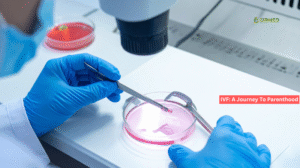 Because tubal ligation is meant to be permanent, reversing the surgery is often difficult and not very successful.
Because tubal ligation is meant to be permanent, reversing the surgery is often difficult and not very successful.

 Let us be clear right away: You do not need to have an orgasm to get
Let us be clear right away: You do not need to have an orgasm to get  These uterine contractions are stimulated by a sudden, powerful release of the hormone oxytocin. Oxytocin is known as the “love hormone” because it promotes bonding, but it is also a powerful factor in the reproductive system (it’s the same hormone used to induce labor).
These uterine contractions are stimulated by a sudden, powerful release of the hormone oxytocin. Oxytocin is known as the “love hormone” because it promotes bonding, but it is also a powerful factor in the reproductive system (it’s the same hormone used to induce labor).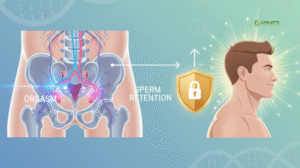

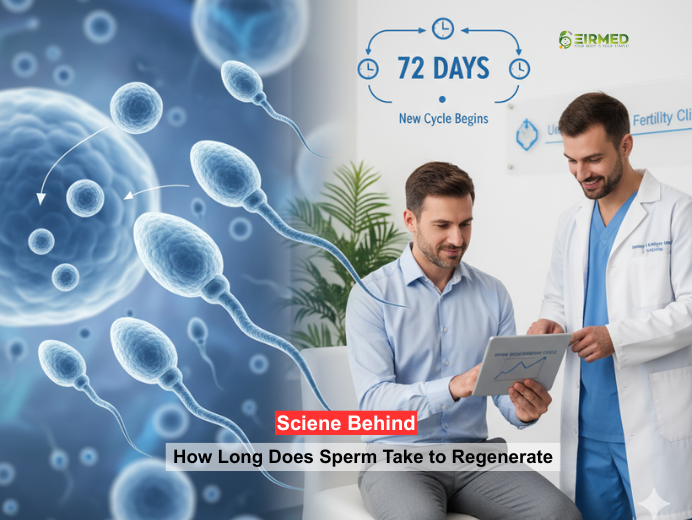
 The simple answer is that your body is a sperm-making factory that works 24/7. However, for a single sperm cell to go from its very beginning stage to a fully mature, ejaculation-ready “swimmer,” the complete process known as spermatogenesis, takes an average of 64 to 74 days (roughly 2.5 to 3 months).
The simple answer is that your body is a sperm-making factory that works 24/7. However, for a single sperm cell to go from its very beginning stage to a fully mature, ejaculation-ready “swimmer,” the complete process known as spermatogenesis, takes an average of 64 to 74 days (roughly 2.5 to 3 months). Your lifestyle choices are the most powerful factors determining the quality of your newly regenerated sperm.
Your lifestyle choices are the most powerful factors determining the quality of your newly regenerated sperm. This comparison highlights why men have such a fantastic opportunity to influence their fertility in a relatively short period. If you and your partner are on a treatment path, adopting these changes for the next 90 days can be your greatest contribution to the effort. Even centers like the Center for Reproductive Medicine emphasize the importance of men being fully engaged in the preparation phase.
This comparison highlights why men have such a fantastic opportunity to influence their fertility in a relatively short period. If you and your partner are on a treatment path, adopting these changes for the next 90 days can be your greatest contribution to the effort. Even centers like the Center for Reproductive Medicine emphasize the importance of men being fully engaged in the preparation phase.

 For the best results with your Letrozole for fertility cycle, pay close attention to the following 10 points.
For the best results with your Letrozole for fertility cycle, pay close attention to the following 10 points. Now that we know what to avoid, here is a quick table on what to choose to help your treatment succeed!
Now that we know what to avoid, here is a quick table on what to choose to help your treatment succeed!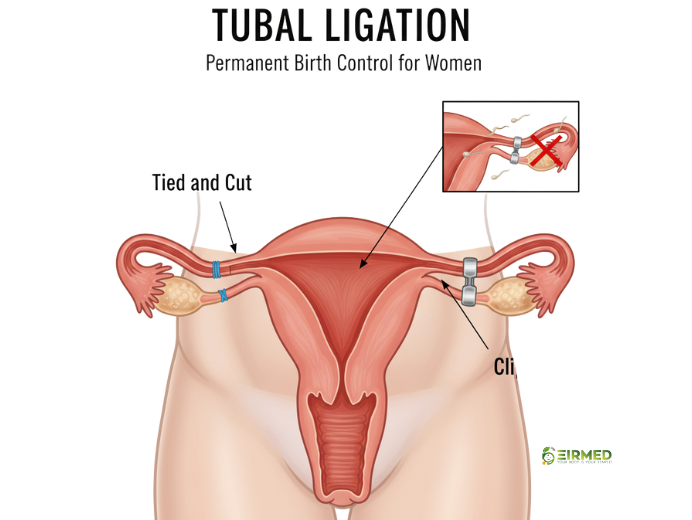
 If you’re reading this, it means your heart has changed its mind. You may have chosen to get your tubes tied, the procedure called tubal ligation in the past, thinking your family was complete. But life often brings new dreams, new partners, or a desire to hold another child. Now, you have a huge question burning in your mind: “Can you untie your tubes?”
If you’re reading this, it means your heart has changed its mind. You may have chosen to get your tubes tied, the procedure called tubal ligation in the past, thinking your family was complete. But life often brings new dreams, new partners, or a desire to hold another child. Now, you have a huge question burning in your mind: “Can you untie your tubes?”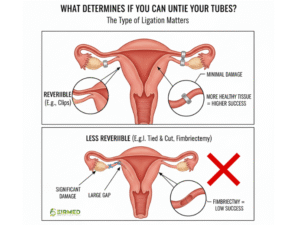 The very first step in determining if a tubal reversal surgery is possible is knowing how your tubes were tied. The success of the reversal hinges entirely on how much healthy fallopian tube is left to repair.
The very first step in determining if a tubal reversal surgery is possible is knowing how your tubes were tied. The success of the reversal hinges entirely on how much healthy fallopian tube is left to repair. When you’re considering a
When you’re considering a 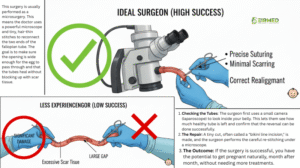 A
A 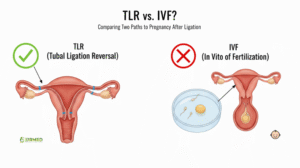 Money is a practical reality in every family-building decision. When deciding if you can you untie your tubes, you must compare the cost of reversal surgery to the cost of In Vitro Fertilization (IVF).
Money is a practical reality in every family-building decision. When deciding if you can you untie your tubes, you must compare the cost of reversal surgery to the cost of In Vitro Fertilization (IVF). You must understand the most important risk when you try to get pregnant after a
You must understand the most important risk when you try to get pregnant after a 
 Throughout history, the symbolism of colors has woven through various cultures, embodying the essence of fertility and life’s renewal. Consider ancient Egypt, where the color green adorned the god Osiris, symbolizing the rejuvenation brought by the fertile silt of the Nile. What color represents fertility? This question often arises when people consider symbols of new life, growth, and hope. In many cultures around the world, colors hold deep meanings associated with fertility.
Throughout history, the symbolism of colors has woven through various cultures, embodying the essence of fertility and life’s renewal. Consider ancient Egypt, where the color green adorned the god Osiris, symbolizing the rejuvenation brought by the fertile silt of the Nile. What color represents fertility? This question often arises when people consider symbols of new life, growth, and hope. In many cultures around the world, colors hold deep meanings associated with fertility. Long ago, people used colors to tell stories about life and birth. In ancient times, the color associated with fertility often came from nature. For example, early humans associated green with fields where crops grew well, linking it to an abundance of food and children. In Egypt, the god Osiris was depicted with green skin, symbolizing rebirth and the fertility of the land along the Nile River. In other places, such as India, red has been a symbol of fertility for thousands of years. Brides wear red to wish for a happy marriage and many kids. This demonstrates that colors are not just aesthetically pleasing; they carry power in shaping beliefs. Today, we still see these ideas in holidays, art, and even medical spaces. At fertility clinics, soft colors like blue might calm patients during treatments.
Long ago, people used colors to tell stories about life and birth. In ancient times, the color associated with fertility often came from nature. For example, early humans associated green with fields where crops grew well, linking it to an abundance of food and children. In Egypt, the god Osiris was depicted with green skin, symbolizing rebirth and the fertility of the land along the Nile River. In other places, such as India, red has been a symbol of fertility for thousands of years. Brides wear red to wish for a happy marriage and many kids. This demonstrates that colors are not just aesthetically pleasing; they carry power in shaping beliefs. Today, we still see these ideas in holidays, art, and even medical spaces. At fertility clinics, soft colors like blue might calm patients during treatments. In today’s world, colors are used in fertility clinics to create welcoming spaces. Soft greens and blues help patients relax during exams or treatments. Some doctors suggest color therapy, where you surround yourself with vibrant hues to boost your mood and mindset.
In today’s world, colors are used in fertility clinics to create welcoming spaces. Soft greens and blues help patients relax during exams or treatments. Some doctors suggest color therapy, where you surround yourself with vibrant hues to boost your mood and mindset.
 If you’ve been trying to start a family and things feel off, fertility hormone imbalance in both male and female bodies might be the quiet reason behind it. Hormones are like the body’s messengers, guiding everything from egg release in women to sperm production in men. When these signals get mixed up, it can make conception tougher than it should be. But here’s the good news: understanding this early opens doors to simple fixes and hopeful journeys. At EIRMED, we see so many couples turn things around with the right knowledge and support. Let’s walk through what this means for you, step by step, so you feel less alone and more in charge.
If you’ve been trying to start a family and things feel off, fertility hormone imbalance in both male and female bodies might be the quiet reason behind it. Hormones are like the body’s messengers, guiding everything from egg release in women to sperm production in men. When these signals get mixed up, it can make conception tougher than it should be. But here’s the good news: understanding this early opens doors to simple fixes and hopeful journeys. At EIRMED, we see so many couples turn things around with the right knowledge and support. Let’s walk through what this means for you, step by step, so you feel less alone and more in charge. Hormones keep our reproductive systems running smoothly, but when levels shift too high or too low it creates a ripple effect. For women, this often ties to conditions like polycystic ovary syndrome (PCOS), where male-like hormones called androgens build up and block regular ovulation. In men, low testosterone can slow sperm creation, leading to fewer or weaker swimmers. This imbalance isn’t rare; it affects up to 10% of women of childbearing age and a similar share of men facing fertility challenges.
Hormones keep our reproductive systems running smoothly, but when levels shift too high or too low it creates a ripple effect. For women, this often ties to conditions like polycystic ovary syndrome (PCOS), where male-like hormones called androgens build up and block regular ovulation. In men, low testosterone can slow sperm creation, leading to fewer or weaker swimmers. This imbalance isn’t rare; it affects up to 10% of women of childbearing age and a similar share of men facing fertility challenges. For women, the triggers often start with the ovaries and brain signals. PCOS tops the list, caused by genes, insulin resistance (when your body doesn’t use sugar well), or inflammation from diet. Thyroid problems, either underactive (hypothyroidism) or overactive mess with estrogen and progesterone, the key players in monthly cycles. Age plays a role too; as you near 35, natural dips in follicle-stimulating hormone (FSH) can signal perimenopause sneaking in early.
For women, the triggers often start with the ovaries and brain signals. PCOS tops the list, caused by genes, insulin resistance (when your body doesn’t use sugar well), or inflammation from diet. Thyroid problems, either underactive (hypothyroidism) or overactive mess with estrogen and progesterone, the key players in monthly cycles. Age plays a role too; as you near 35, natural dips in follicle-stimulating hormone (FSH) can signal perimenopause sneaking in early. Symptoms whisper before they shout, but listening early saves heartache. Fertility hormone imbalance shows up differently in men and women, yet both share that nagging sense something’s not right.
Symptoms whisper before they shout, but listening early saves heartache. Fertility hormone imbalance shows up differently in men and women, yet both share that nagging sense something’s not right.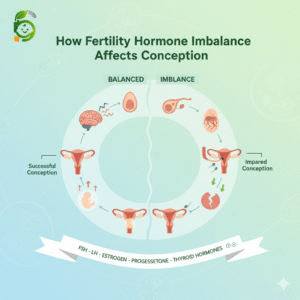 When
When 
 What is sperm morphology? It refers to the shape and size of sperm cells. This aspect of male fertility reveals a great deal about how effectively sperm can reach and unite with an egg. Many people are unfamiliar with it, but understanding it can be beneficial if you are planning a family. At EIRMED, our site focuses on fertility for men and women. We offer medicines and treatments to support your needs, like supplements for better sperm health. In this guide, we will explain everything in simple words. We want you to feel informed and hopeful.
What is sperm morphology? It refers to the shape and size of sperm cells. This aspect of male fertility reveals a great deal about how effectively sperm can reach and unite with an egg. Many people are unfamiliar with it, but understanding it can be beneficial if you are planning a family. At EIRMED, our site focuses on fertility for men and women. We offer medicines and treatments to support your needs, like supplements for better sperm health. In this guide, we will explain everything in simple words. We want you to feel informed and hopeful. Sperm morphology looks at the head, middle part, and tail of each sperm. The head holds the DNA, which is the information needed for a baby. It should be oval and smooth. The middle part gives energy for swimming. The tail helps it move forward like a whip. When we ask, ‘What is sperm morphology?’ we mean checking if these parts are formed correctly.
Sperm morphology looks at the head, middle part, and tail of each sperm. The head holds the DNA, which is the information needed for a baby. It should be oval and smooth. The middle part gives energy for swimming. The tail helps it move forward like a whip. When we ask, ‘What is sperm morphology?’ we mean checking if these parts are formed correctly. How to get pregnant with poor sperm morphology? This question worries many couples trying to have a baby.
How to get pregnant with poor sperm morphology? This question worries many couples trying to have a baby.  What could be behind those unusual sperm shapes? Several things can lead to abnormal sperm morphology, also known as teratozoospermia. Genetics plays a role; some men inherit traits that affect the form of their sperm. Environmental factors, such as exposure to toxins like pesticides or heavy metals, can also alter sperm structure.
What could be behind those unusual sperm shapes? Several things can lead to abnormal sperm morphology, also known as teratozoospermia. Genetics plays a role; some men inherit traits that affect the form of their sperm. Environmental factors, such as exposure to toxins like pesticides or heavy metals, can also alter sperm structure. Testing is easy and key to understanding what
Testing is easy and key to understanding what  Good news: You can often make sperm morphology better. Start with healthy eating. Foods rich in fruits, vegetables, nuts, and fish are beneficial. They give antioxidants to protect sperm.
Good news: You can often make sperm morphology better. Start with healthy eating. Foods rich in fruits, vegetables, nuts, and fish are beneficial. They give antioxidants to protect sperm.